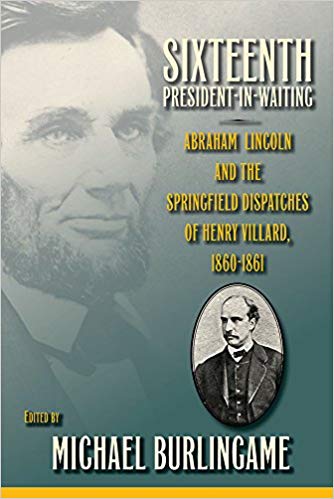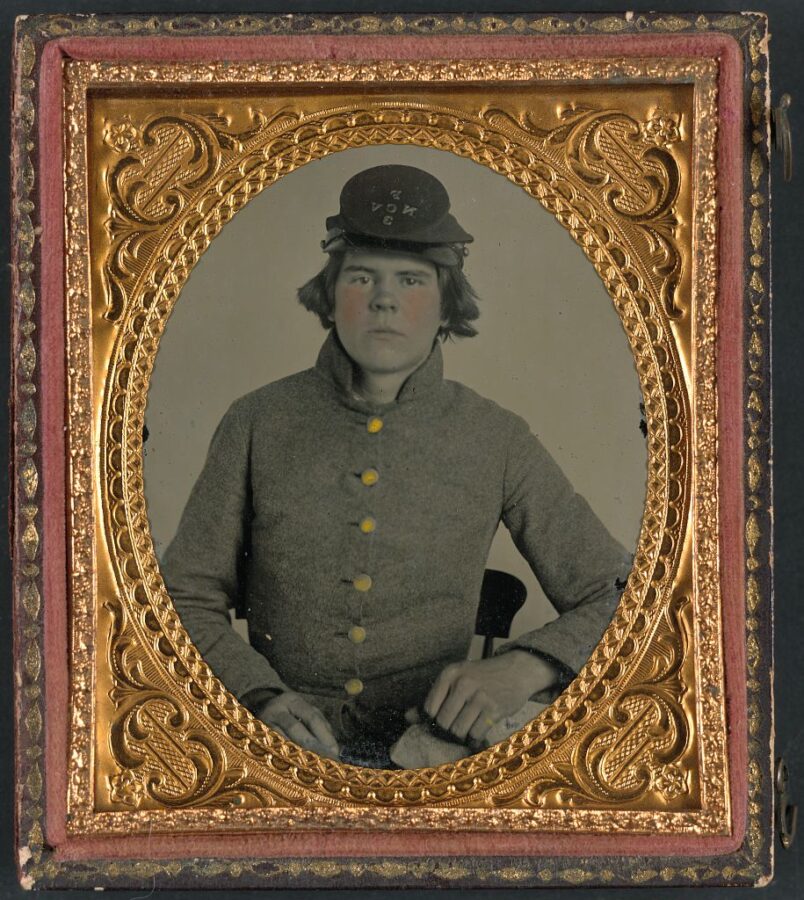Sixteenth President-in-Waiting: Abraham Lincoln and the Springfield Dispatches of Henry Villard, 1860-1861 edited by Michael Burlingame. Southern Illinois University Press, 2018. Cloth, ISBN: 978-0809336432. $45.50.
 Scholars tend to emphasize Henry Villard’s years as a nineteenth century railroad promoter and financier. Yet as editor Michael Burlingame astutely notes, long before Villard became a railroad magnate and financier, he was a journalist. Indeed, Villard’s “most noteworthy reportage dates from late 1860 and early 1861, when he was embedded in Springfield for the three months following Lincoln’s election” (1). Villard’s dispatches from Springfield, published in the New York Herald, the Cincinnati Commercial, and the San Francisco Bulletin, “constitute the most intensive journalistic coverage that Lincoln ever experienced” (1). Burlingame, the Chancellor Naomi B. Lynn Distinguished Chair in Lincoln Studies at the University of Illinois Springfield, does scholars and the reading public a service by collecting and annotating Villard’s dispatches. They provide a more complete view of Lincoln, his associates, and the country during the crucial months between Lincoln’s election and his inauguration.
Scholars tend to emphasize Henry Villard’s years as a nineteenth century railroad promoter and financier. Yet as editor Michael Burlingame astutely notes, long before Villard became a railroad magnate and financier, he was a journalist. Indeed, Villard’s “most noteworthy reportage dates from late 1860 and early 1861, when he was embedded in Springfield for the three months following Lincoln’s election” (1). Villard’s dispatches from Springfield, published in the New York Herald, the Cincinnati Commercial, and the San Francisco Bulletin, “constitute the most intensive journalistic coverage that Lincoln ever experienced” (1). Burlingame, the Chancellor Naomi B. Lynn Distinguished Chair in Lincoln Studies at the University of Illinois Springfield, does scholars and the reading public a service by collecting and annotating Villard’s dispatches. They provide a more complete view of Lincoln, his associates, and the country during the crucial months between Lincoln’s election and his inauguration.
There are many reasons why scholars and a general audience will welcome this volume. For one, Villard’s reporting swings between hilarious inaccuracy and incisive analysis. In his inconsistent reportage, Villard captures broader patterns in journalism and tells readers as much about the ways in which people reported the news as the news itself. In the November 11, 1860 edition of the New York Herald, for instance, Villard predicted Lincoln’s cabinet: John McLean as Secretary of State, William L. Dayton as Secretary of the Treasury, Fitz Henry Warren as Postmaster General, Cassius M. Clay as Secretary of War, Emerson Etheridge as Secretary of the Navy, Galusha A. Grow as Secretary of the Interior, and Henry Winter Davis as Attorney General. Anyone familiar with the Lincoln presidency knows that none of these predictions were accurate. Nevertheless, Villard based his predictions on the rumors swirling around Springfield. Thus, he provides an idea of the people some U.S. citizens wanted to see in Lincoln’s cabinet.
On the other hand, given his access to Lincoln, Villard kept the country informed about who Lincoln met with, the general contours of their discussions, and Lincoln’s thoughts about secession and the crisis of the Union. For example, he wrote in the November 21, 1860 edition of the Cincinnati Commercialthat Lincoln, “deplores the infatuation of the cotton States, but, being unconscious of any wrong on his part, does not dream of making any concessions to the spirit of rebellion” (33).
Sixteenth President-in-Waitingcontains useful nuggets of information for students of this period. Villard kept readers informed of the flood of people—very often office-seekers—but also curious citizens, politicians, and many others who went to see Lincoln. The quest for offices in the nineteenth century was perpetual. Lincoln, as did all politicians, suffered from the attentions of office-seekers. Villard consistently cautioned office seekers not to waste their time, but plenty did so anyway. Villard left a record of the nameless people who besieged Lincoln for favors and sent him hundreds of letters filled with unsolicited advice. He also paid attention to the powerful and privileged people who thronged to Springfield; a dazzling array of personalities dance across the pages of this volume. Villard devoted extensive attention to the machinations of Simon Cameron, who publicly professed little interest in joining Lincoln’s cabinet, but who worked behind the scenes to make it happen. Villard took great delight in ferreting out people who came to Springfield and attempted to remain inconspicuous. For instance, he quickly identified Hiram Barney, George Opdyke, and Henry Hogeboom of New York, despite their attempts to remain incognito. Villard commented, likely correctly, “it is neither sensible nor practicable to come to Springfield unobserved. The town is too small and the reporters too vigilant” (207). In patting himself on the back for good detective work, Villard demonstrated why he is such a useful guide to the times; he had an eye for news and gossip, but was judicious about his reporting and dogged in unearthing facts.
The final reason why this volume is so important is because Burlingame includes Villard’s newspaper dispatches written during the Lincoln-Douglas debates of 1858. Even a cursory read of the 1858 dispatches demonstrate how Villard’s ideas about Lincoln evolved. In 1858, for example, Villard, a Douglas partisan, frequently denounced Lincoln. In commenting on Lincoln’s speeches, he wrote, “there is no refinement of speech, no noble flourish—on the contrary a characteristic clumsiness; no elevation of thought, but rather a degree of cheapness; no logical arguments” (318). Furthermore, he sneered, “I have seldom seen a more awkward man than A. Lincoln” (318). Villard frequently condemned Lincoln as the lesser of the two men and rarely had a good word to say about him. However, just two years later, his attitude had changed considerably, and Villard came to admire and respect Lincoln.
Michael Burlingame has produced a number of important collections of primary sources throughout his prolific career. Sixteenth President-in-Waitingis no exception. Henry Villard’s newspaper dispatches are a rich resource for students of the Secession Winter and will interest both a scholarly and a general audience.
Evan C. Rothera teaches courses in the Department of History at Sam Houston State University. His book on Civil Wars and Reconstructions in the U.S., Mexico, and Argentina is forthcoming with Louisiana State University Press.

